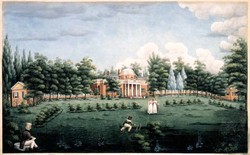Thomas Jefferson Slave
|
| updated |
Copy Link Code
|
 In the time of Thomas Jefferson, slavery was the institutional backbone of society and economics in the Southern colonies. Jefferson was born into a wealthy planter family in the hilly Piedmont region of Virginia and inculcated from an early age with theories of racial superiority expressed as natural science. After his father died when he was only 14, Jefferson inherited over twenty slaves and thousands of acres including the Monticello estate, all to be held in trust until he reached the age of majority. Despite the bond between Thomas Jefferson and the Enlightenment philosophers who inspired his zeal for liberty, he would never come to grips with his own role as an oppressor of freedom and denier of equality. Upon assuming control of Monticello, Jefferson immediately set himself to creating greater profit out of slave labor by expanding his holdings through real estate deals and introducing less volatile crops than tobacco. There is no question that Jefferson took his occupation as a planter as seriously as his career in law and politics; indeed, Monticello, the nearby Poplar Forest, and his other plantations would be Jefferson's main source of income and personal debt throughout his life. After the death of his father-in-law, John Wayles, Jefferson inherited 11,000 more acres and 135 more slaves along with a long list of accounts owed. With so much debt to pay and only one way that he could imagine creating revenue, Jefferson invested whole heartedly in slave labor.
In the time of Thomas Jefferson, slavery was the institutional backbone of society and economics in the Southern colonies. Jefferson was born into a wealthy planter family in the hilly Piedmont region of Virginia and inculcated from an early age with theories of racial superiority expressed as natural science. After his father died when he was only 14, Jefferson inherited over twenty slaves and thousands of acres including the Monticello estate, all to be held in trust until he reached the age of majority. Despite the bond between Thomas Jefferson and the Enlightenment philosophers who inspired his zeal for liberty, he would never come to grips with his own role as an oppressor of freedom and denier of equality. Upon assuming control of Monticello, Jefferson immediately set himself to creating greater profit out of slave labor by expanding his holdings through real estate deals and introducing less volatile crops than tobacco. There is no question that Jefferson took his occupation as a planter as seriously as his career in law and politics; indeed, Monticello, the nearby Poplar Forest, and his other plantations would be Jefferson's main source of income and personal debt throughout his life. After the death of his father-in-law, John Wayles, Jefferson inherited 11,000 more acres and 135 more slaves along with a long list of accounts owed. With so much debt to pay and only one way that he could imagine creating revenue, Jefferson invested whole heartedly in slave labor.
Although he half-heartedly considered manumission for all of his slaves in personal letters and a journal, the fact that Jefferson was so tied to slavery economically would hinder him from ever taking action on the lofty ideals that he often espoused. Indeed, the enlightened Thomas Jefferson view on slavery seems completely out of touch with the actual Thomas Jefferson, slave owner. In many ways, Jefferson was a forward-thinking intellectual whose passion for liberty inspired a whole new form of democracy; at home in Monticello, however, he was master over hundreds of human beings and, allegedly, the father of some of the slaves who worked as domestic servants around him. When details of Jefferson's relationship with a slave who also happened to be his late wife's half-sister came to light during his political career, the scandal did not seem to ruin him. It is important to remember that the voting population of the United States was dramatically different at the time; only white, male property-owners could vote and abolitionism had yet to gain much ground in America, even in New England.
Just as Thomas Jefferson owned slaves, so too did another six of the Founding Fathers including George Washington. The only difference among them was that Washington would be the only one to emancipate all of his slaves. Jefferson did express the view that slavery was contradictory to American principles and advocated gradual abolition through the legislative process. Because of his pseudo-scientific racial theories, however, Jefferson did not believe that Africans and Europeans could live harmoniously in one nation. He warned against the danger of rushing to emancipate African Americans and believed that full deportation was the best solution.
